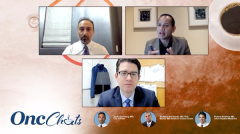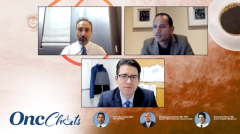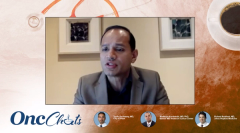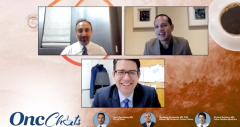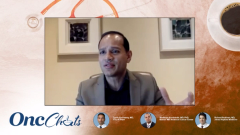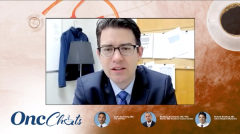
Taking Organoids From Bench to Bedside Through Endoscopy in Pancreatic Cancer: Ongoing Research
In this seventh episode of OncChats: Taking Organoids From Bench to Bedside Through Endoscopy in Pancreatic Cancer, Toufic A. Kachaamy, MD, Madappa Kundranda, MD, PhD, and Richard Burkhart, MD, discuss ongoing research such as the PASS-01 trial (NCT04469556) in pancreatic cancer and ways to translate advances in the metastatic setting to the curative setting.
Episodes in this series

In this seventh episode of OncChats: Taking Organoids From Bench to Bedside Through Endoscopy in Pancreatic Cancer, Toufic A. Kachaamy, MD, of City of Hope, Madappa Kundranda, MD, PhD, of Banner MD Anderson Cancer Center, and Richard Burkhart, MD, of Johns Hopkins Medicine, discuss ongoing research such as the PASS-01 trial (NCT04469556) in pancreatic cancer and ways to translate advances in the metastatic setting to the curative setting.
Burkhart: One of the trials that I think I’m most excited about...is the PASS-01 trial [NCT04469556]; [this is a] head-to-head [trial of] gemcitabine and nab-paclitaxel vs FOLFIRINOX [in the metastatic setting]. Then, alongside that clinical pathway, they’re growing organoids. That’s [an effort] that I think will help to clarify at least first-line [treatment] in the metastatic setting. As a surgeon who approaches every patient with a curative eye, I’m now [questioning], how can we move those data into a setting where I can cure a patient with an operation after or alongside effective chemotherapeutics?
Kundranda: Exactly, because again, going back to the data, 20% of patients with pancreatic cancer are resectable; however, of that 20%, 50% [of patients] don’t make it to the operating room. The numbers are staggering in terms of how concerning that problem is. If we can change the paradigm in those patients, we will have a lot of patients that we could potentially cure, but also a lot of patients [who] don’t need to [go] through these unnecessary procedures—whether it’s a Whipple or whatever we’re trying to do without changing the overall survival.
Burkhart: Yes, and this brings us back to the first question that you asked about multidisciplinary care. [We have] our endoscopists, who are pushing the envelope and coming up with great new techniques to help us in the service of these patients. [We also have] our medical oncology colleagues, who are taking on these tough questions [such as] asking whether gemcitabine vs nab-paclitaxel or FOLFIRINOX is better. Then, [we have] our surgical community where we’re pushing that 20% [of patients] are amenable to a surgical resection and pushing into the borderline resectable group and pushing into the locally advanced group, so that we’re now taking 50% of patients to the operating room rather than just 20%. We urgently need that translational research component to come through and help with what we’re doing clinically.
Kundranda: This was extremely informative, Dr Burkhart. This was truly exciting...Thank you so much for your time. I’ll give this back to you Dr Kachaamy.
Kachaamy: Thank you very much for joining me. This was a great discussion. Obviously, a lot of work has been done. A lot more work needs to be done to help patients with pancreatic cancer, and we need more scientists like you pushing the envelope from the bench to the bedside. Thank you very much.


